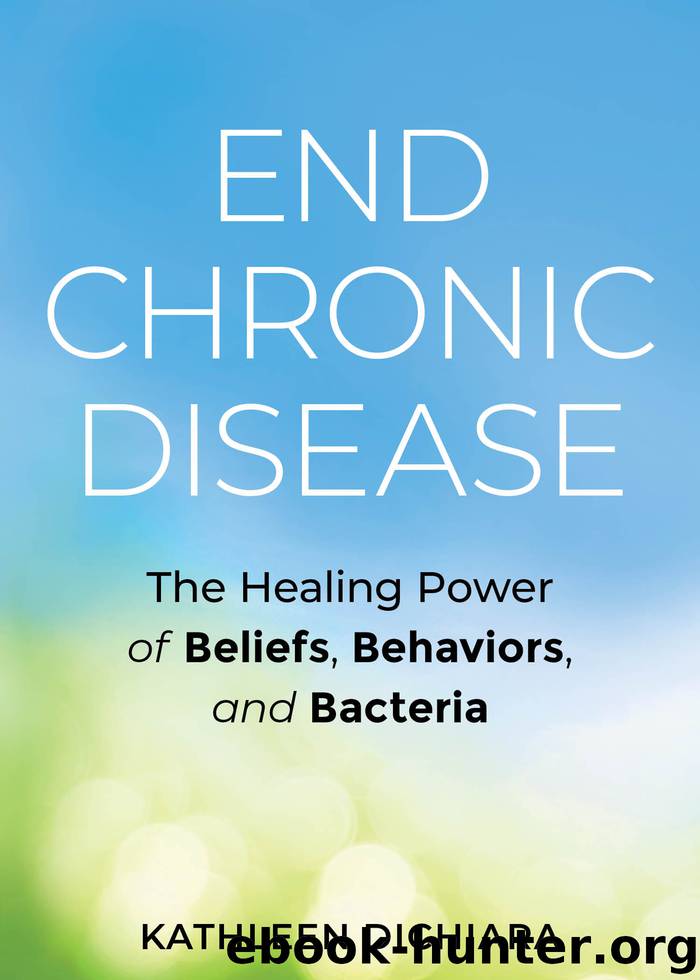End Chronic Disease by Kathleen DiChiara

Author:Kathleen DiChiara
Language: eng
Format: epub
Publisher: Hay House
Published: 2019-12-13T16:00:00+00:00
REDEFINE STRESS
Historically, the stress response was essential for our survival, as it still can be today during emergencies. Stimulated adrenals can help you react quickly in the midst of chaos and navigate your way out of dangerous situations. Stress has a reputation for its negative health impact and is largely identified as something to be avoided as much as possible. But stress isn’t always a bad thing.
We have been conditioned to think that we can “manage” or “control” our stress, which is often generated from sources outside of our control—like our work, relationships, traffic, politics, death, trauma, and so on. And once we are in a state of stress, we are more likely to engage in unhealthy lifestyle behaviors as a reaction to the overwhelm.
Stress is a stimulus. When we redefine it as such, we can begin to understand that its negative effect on us implies we are losing our ability to cope. Therefore, trying to control or manage it will likely be ineffective and certainly not sustainable. Certainly, using behavioral techniques like daily breathwork during stressful situations can help serve as an anchor, but rather than using lifestyle strategies to merely navigate stress, you must build up your capacity to adapt to it—and you should start working on this now, long before stress strikes.
Nature teaches us that stress may actually have some positive attributes. Plants increase polyphenols when they are exposed to stressful elements of nature, such as severe weather, disease, or predator attacks. During times of anticipated droughts, plants have the capacity to upregulate polyphenols, which turn on their longevity genes so that the animals that eat the plants can tolerate longer periods without rain. We too benefit from eating plants that are subjected to changing, stressful environments (remember the wild foods!). And there’s much to learn from these plants, which are conditioned to respond in kind to all of the elements—good and bad.
Similarly, we can use stress as a stimulus for growth and change. The key is to recognize these opportunities and acknowledge them as life-enhancing rather than debilitating. Since you can’t avoid stress or get rid of it altogether, you can redefine what stress is for you and recondition your body and mind to respond differently to it. You are an intelligent being with very complex organs and systems that harmonize and function beautifully. You are designed to survive and thrive in a world of challenges. Your capacity to recover and rebound from challenging events, including illness, is stress resilience.
We can transform our response to stress by defining it rather than denying it. This is not about dwelling upon it but is instead about clearly recognizing the stress we are facing. Research shows that just acknowledging your stress can register proactively in your brain, shifting you from the automatic and reactive centers to the more conscious and deliberate ones. In other words, purposefully acknowledging stress lets you pause your visceral reaction, allowing you to choose a more life-enhancing response. Resilient people understand that stress is a part of living with the ebb and flow of life.
Download
This site does not store any files on its server. We only index and link to content provided by other sites. Please contact the content providers to delete copyright contents if any and email us, we'll remove relevant links or contents immediately.
Periodization Training for Sports by Tudor Bompa(8275)
Why We Sleep: Unlocking the Power of Sleep and Dreams by Matthew Walker(6727)
Paper Towns by Green John(5194)
The Immortal Life of Henrietta Lacks by Rebecca Skloot(4589)
The Sports Rules Book by Human Kinetics(4391)
Dynamic Alignment Through Imagery by Eric Franklin(4217)
ACSM's Complete Guide to Fitness & Health by ACSM(4060)
Kaplan MCAT Organic Chemistry Review: Created for MCAT 2015 (Kaplan Test Prep) by Kaplan(4014)
Introduction to Kinesiology by Shirl J. Hoffman(3776)
Livewired by David Eagleman(3775)
The Death of the Heart by Elizabeth Bowen(3624)
The River of Consciousness by Oliver Sacks(3606)
Alchemy and Alchemists by C. J. S. Thompson(3522)
Bad Pharma by Ben Goldacre(3428)
Descartes' Error by Antonio Damasio(3279)
The Emperor of All Maladies: A Biography of Cancer by Siddhartha Mukherjee(3164)
The Gene: An Intimate History by Siddhartha Mukherjee(3099)
The Fate of Rome: Climate, Disease, and the End of an Empire (The Princeton History of the Ancient World) by Kyle Harper(3067)
Kaplan MCAT Behavioral Sciences Review: Created for MCAT 2015 (Kaplan Test Prep) by Kaplan(2987)
